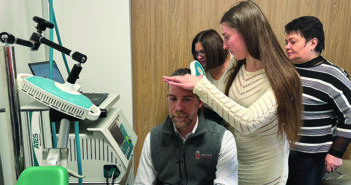Taking on tanning
Now that he’s looking at Rhode Islanders as a population, Qureshi has found that skin cancer is quite prevalent in the state. “The early data suggest that there’s plenty of skin cancer in Rhode Island, and it’s probably because of the lifestyle,” he says—a lifestyle that often includes trips to tanning salons. “Indoor tanning is a huge problem in the state,” he says. “I’ve actually been working on trying to change the policy on tanning. I would like to have tanning prohibited for people under the age of 18.
“Frequent use of tanning beds certainly increases your risk of melanoma. There’s no question about that,” he adds. In fact, Qureshi has found that indoor tanning increases a person’s chances of developing two other forms of skin cancer: squamous cell carcinoma and basal cell carcinoma. And tanning raises the likelihood of having more aggressive tumors.
Repeated tanning salon visits are especially problematic for young people. Qureshi and his colleagues have found a strong correlation between the age at which people start tanning and their risk of one day being diagnosed with skin cancer. This is troublesome because teens are a target population for tanning salons. “My favorite ad that I show when I give talks is from the Indoor Tanning Association,” Qureshi says. “It comes out right around prom season and includes the ‘benefits of tanning.’”
It’s not enough to warn people about the dangers of tanning beds. Recent research by Qureshi and others has shown that some people become physically or psychologically dependent on tanning. Exposure to the sun or a tanning bed can release feel-good endorphins like those that cause “runner’s high” in longdistance runners, and people who suffer from seasonal affective disorder may find that their symptoms lessen following a tanning session.
Qureshi wants to further explore why people tan so he can learn which interventions are most likely to help them stop. “Who uses more tanning beds? Is there a genetic basis for that? Is there a behavioral basis for that? Is there a skin color specificity? Is there an age, gender bias?” he asks. He is especially interested in the psychosocial basis of tanning as well as the relationship between tanning and mental health issues such as anxiety, depression, and body dysmorphic disorder. To answer these questions, he’s collaborating with behavioral mental health specialists.
If that doesn’t work, Qureshi may consider the political route and push for a ban on underage indoor tanning. Since
2010, Rhode Islanders under the age of 18 require a note from a doctor or parent at every other indoor tanning session. The use of UV tanning devices by minors is banned outright in 11 states.
One common thread links Qureshi’s anti-tanning push, his population studies, and his approach to clinical practice: he truly wants to help people. “The magic of the work that we’re doing is that we want to make an impact on health care within five years,” he says. The way things are going so far, it looks like Qureshi is right on target.




